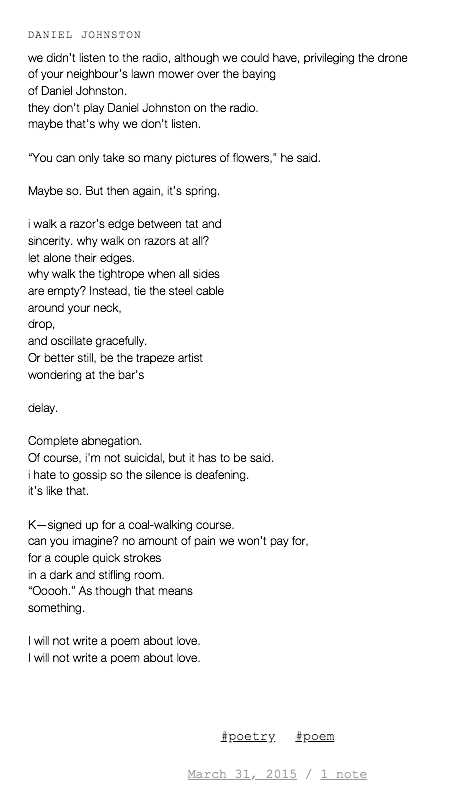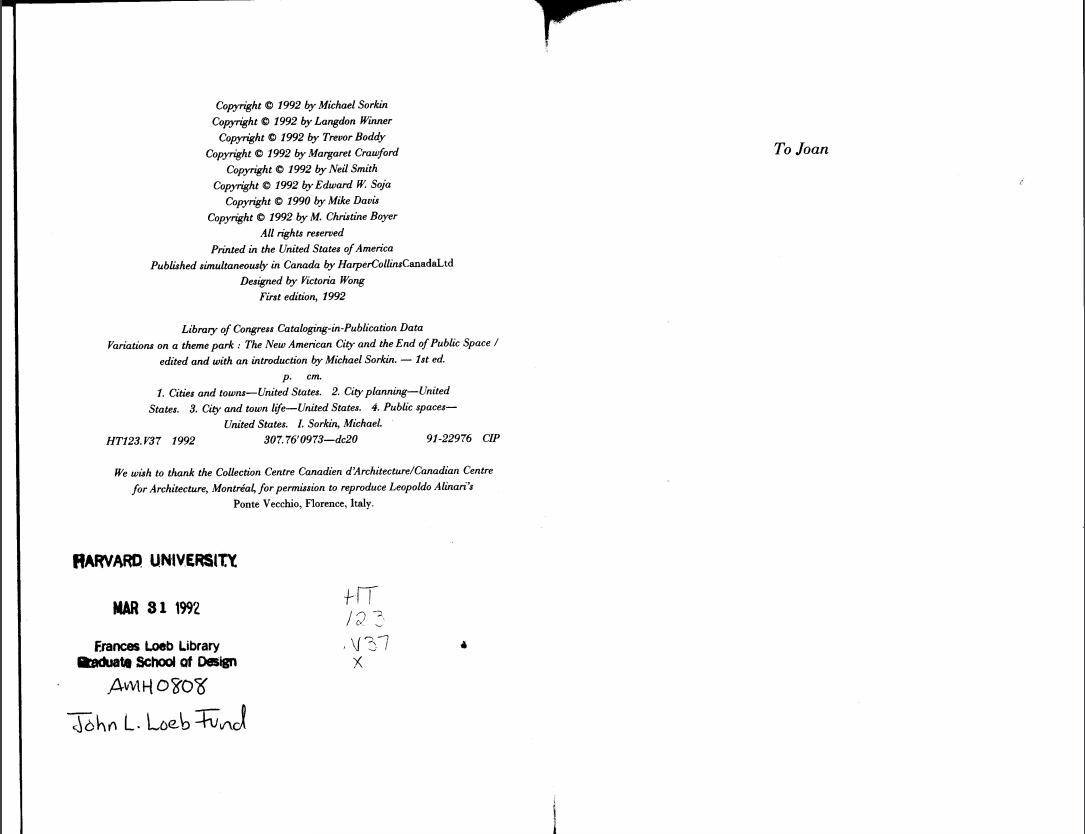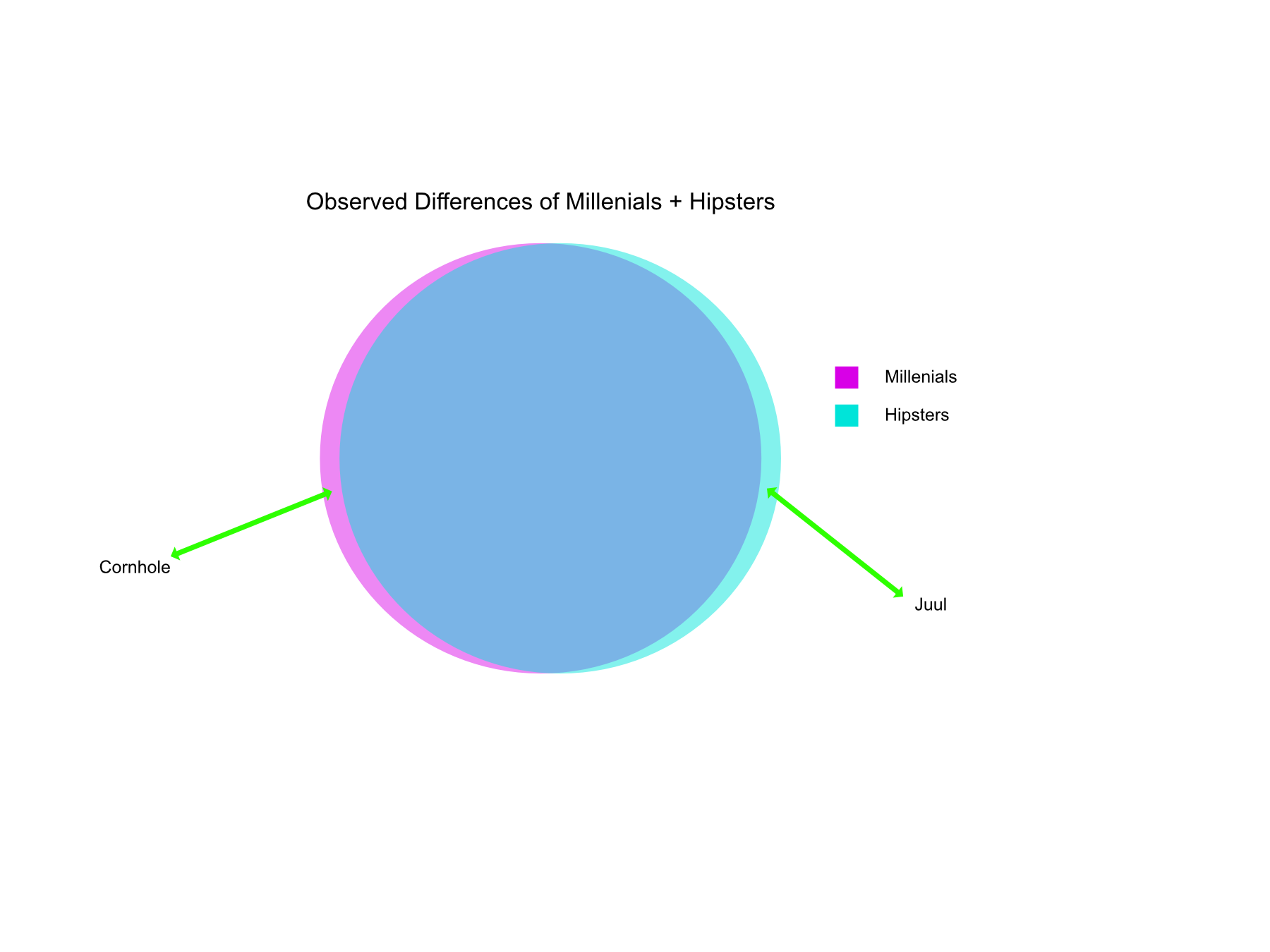How Not to be Eroded
How Not to be Eroded

Freedom
04 Nov 2019
![]()
Received the above promotional email from Cargo. Think: the only freedom I take is long or longer, and wonder if this is true, obliquely of course, in other areas of my life.
PS. Moved another stack of papers today, this time from the desk onto the floor. A very different emotional outcome. Evidence in favor of ‘the new place’ over ‘the act of placing.’

Received the above promotional email from Cargo. Think: the only freedom I take is long or longer, and wonder if this is true, obliquely of course, in other areas of my life.
PS. Moved another stack of papers today, this time from the desk onto the floor. A very different emotional outcome. Evidence in favor of ‘the new place’ over ‘the act of placing.’
Placement
30 Sept 2019
I moved a bunch of papers this morning - from a stack on the shelf into a thin cardboard box, replaced on the shelf. It’s what I think is called a ‘sweater box,’ complete with red tissue paper, that a gift came in last Christmas.
Among the newly placed papers are:
-love letters (received)
-love letters (unsent)
-collages
-train ticket stubs (CDG to Paris, Paris to CDG)
-negative test prints ca.2006
-birthday cards
-postcards (blank and received)
&etc
Either the new placement or the act of placing has elevated these items. I wonder whether the noun or the verb did it. The noun: the preciousness of the red tissue paper wrapped around, crinkling; patterned associations with boxes and keepsakes, time capsules, safety deposit boxes, etc; the box creating a collection rather than a stack, something to be protected. The verb: shuffling through rememberances and choosing to keep them; reaffirming (or creating for the first time) their importance; the act of protecting.
I moved a bunch of papers this morning - from a stack on the shelf into a thin cardboard box, replaced on the shelf. It’s what I think is called a ‘sweater box,’ complete with red tissue paper, that a gift came in last Christmas.
Among the newly placed papers are:
-love letters (received)
-love letters (unsent)
-collages
-train ticket stubs (CDG to Paris, Paris to CDG)
-negative test prints ca.2006
-birthday cards
-postcards (blank and received)
&etc
Either the new placement or the act of placing has elevated these items. I wonder whether the noun or the verb did it. The noun: the preciousness of the red tissue paper wrapped around, crinkling; patterned associations with boxes and keepsakes, time capsules, safety deposit boxes, etc; the box creating a collection rather than a stack, something to be protected. The verb: shuffling through rememberances and choosing to keep them; reaffirming (or creating for the first time) their importance; the act of protecting.
Revolution
27 Sept 2019
15 people were arrested at the Atlanta climate strike this morning. The images online show white people being led away by police, their hands cuffed with zip ties. My first thought: how perfect. More plastic.
Reading Sontag on Artaud. She writes, “From the start, the impetus was -- as it still is -- apocalyptic: vivid with complaint and jubilation at the convulsive decay of old social orders, borne up by that worldwide sense of living through a revolutionary moment...” She writes this about literary modernism, but the words tickle of the current climate justice movement. Apocalyptic, vivid with complaint and jubilation. Is it a revolution, or just “the sense of living through a revolutionary moment?” and how does one become the other?
When do revolutionary sentiments become revolutions? Is it a revolution if it still plays by all the rules of the millenium (organizing on Facebook, showing up with painted placards, marching for two hours, going home to your habits and heat stroke)? Which is more effective, that dissent should look new, urgent, unpredictable? Or that it look familiar, cozy, unthreatening and therefore approachable?
“(People tend to become cynical about even the most appalling crisis if it seems to be dragging on, failing to come to term.)” -SS
“The domestication of agony.” -SS
15 people were arrested at the Atlanta climate strike this morning. The images online show white people being led away by police, their hands cuffed with zip ties. My first thought: how perfect. More plastic.
Reading Sontag on Artaud. She writes, “From the start, the impetus was -- as it still is -- apocalyptic: vivid with complaint and jubilation at the convulsive decay of old social orders, borne up by that worldwide sense of living through a revolutionary moment...” She writes this about literary modernism, but the words tickle of the current climate justice movement. Apocalyptic, vivid with complaint and jubilation. Is it a revolution, or just “the sense of living through a revolutionary moment?” and how does one become the other?
When do revolutionary sentiments become revolutions? Is it a revolution if it still plays by all the rules of the millenium (organizing on Facebook, showing up with painted placards, marching for two hours, going home to your habits and heat stroke)? Which is more effective, that dissent should look new, urgent, unpredictable? Or that it look familiar, cozy, unthreatening and therefore approachable?
“(People tend to become cynical about even the most appalling crisis if it seems to be dragging on, failing to come to term.)” -SS
“The domestication of agony.” -SS
Soft materials
17 Sept 2019
Thinking about soft materials. The plant, Mimosa Pudica, folds up its fern-like fronds when touched or shaken. It is also called Shameplant (a sorry chord). It is a member of the ‘sensitive plant’ family.
![]()
They grew along the sidewalks in Tacoma. My sister and I would touch them, watch them shrivel up, wait minutes for them to unfurl, touch them again. An exhausting circuit. The rougher the touch, the faster they close, pinching leaves together two-by-two like thumb and forefinger. Did we think at all about their experience? How common, how funny, to discover something’s sentience only to make a game of it.
Current theme: the returning of books.
Thinking about soft materials. The plant, Mimosa Pudica, folds up its fern-like fronds when touched or shaken. It is also called Shameplant (a sorry chord). It is a member of the ‘sensitive plant’ family.

They grew along the sidewalks in Tacoma. My sister and I would touch them, watch them shrivel up, wait minutes for them to unfurl, touch them again. An exhausting circuit. The rougher the touch, the faster they close, pinching leaves together two-by-two like thumb and forefinger. Did we think at all about their experience? How common, how funny, to discover something’s sentience only to make a game of it.
Current theme: the returning of books.
Hairspray
16 Sept 2019
Dreamt that I held the chickens. They had hair like rabbits, and I was shedding them with a large kitchen knife, lightly dragging it over their fur and pulling soft tufts.
Full weekend. Read Edith Hamilton's Mythology, bumped a volleyball (once), got sand in my loafers. Drank too much (3 days in a row). Danced - liked a song, lyrics something like: "is it wrong to love you, you got me on the red line.” A synthy 80s love song-- sonic permission to be emotional, to rub your hands over your body, to dance like you're wearing hair spray.
Danced to imagined prompts. Examples:
- Dance like you're in love with the ceiling light, now like you're challenging it to a fight.
- Dance like you're giving a gift. Dance like you are the gift itself.
- Dance like Maurice's feathered hat.
I do a dance for each of the chickens, and for Hattie. I did a dance for (and as) a tree I'd watched while eating breakfast Sunday morning, rattling in the wind.
Feeling energetic today. Pulled an Oblique Strategy this morning: "work at a different speed." Craving ramen + a good cappuccino.
Dreamt that I held the chickens. They had hair like rabbits, and I was shedding them with a large kitchen knife, lightly dragging it over their fur and pulling soft tufts.
Full weekend. Read Edith Hamilton's Mythology, bumped a volleyball (once), got sand in my loafers. Drank too much (3 days in a row). Danced - liked a song, lyrics something like: "is it wrong to love you, you got me on the red line.” A synthy 80s love song-- sonic permission to be emotional, to rub your hands over your body, to dance like you're wearing hair spray.
Danced to imagined prompts. Examples:
- Dance like you're in love with the ceiling light, now like you're challenging it to a fight.
- Dance like you're giving a gift. Dance like you are the gift itself.
- Dance like Maurice's feathered hat.
I do a dance for each of the chickens, and for Hattie. I did a dance for (and as) a tree I'd watched while eating breakfast Sunday morning, rattling in the wind.
Feeling energetic today. Pulled an Oblique Strategy this morning: "work at a different speed." Craving ramen + a good cappuccino.
Stolen Property
12 Sept 2019
Behind the prevalent 90s trope of the diary stolen and read, a horror that spans the teen / romcom genres, is the fantasy that anyone cares enough to know you.* This longed for transgression - if only your mom, crush, little brother cared enough to violate your trust. If only there were trust to violate.
Today: Instagram, Twitter, we’re working so hard to externalize. “I’m three years sober.” “My cat died a year ago.” “Today is a hard day, tell your friends you love them.” Steal my diary, steal my diary, steal my diary.
I recognize that I am basically LiveJournaling here. I tell myself: it’s good to write in a way that doesn’t matter at all, to write for no one, to delete it, to pour a little off the top every now and then. Steal my diary.
Daniel Johnston died yesterday. Coincidence: my writing yesterday made me remember this poem before I knew he’d died.
![]()
*Notable exception: Bridget Jones’ Diary, which aptly treats the violation as the cementing of trust.
Behind the prevalent 90s trope of the diary stolen and read, a horror that spans the teen / romcom genres, is the fantasy that anyone cares enough to know you.* This longed for transgression - if only your mom, crush, little brother cared enough to violate your trust. If only there were trust to violate.
Today: Instagram, Twitter, we’re working so hard to externalize. “I’m three years sober.” “My cat died a year ago.” “Today is a hard day, tell your friends you love them.” Steal my diary, steal my diary, steal my diary.
I recognize that I am basically LiveJournaling here. I tell myself: it’s good to write in a way that doesn’t matter at all, to write for no one, to delete it, to pour a little off the top every now and then. Steal my diary.
Daniel Johnston died yesterday. Coincidence: my writing yesterday made me remember this poem before I knew he’d died.

*Notable exception: Bridget Jones’ Diary, which aptly treats the violation as the cementing of trust.
Upwardly Mobile
11 Sept 2019
I’ve been stretching at night, listening to an album by Rudy Adrian.︎︎ It reminds me of a CD called ‘Piano Rain’ that I got out of a sort-of CD vending machine at Costco when I was 8. I listened to it nightly, with the ardor of ritual, for several years. In the middle of ‘Piano Rain’ was a track of just rainfall.
I think the stretching is making it harder to fall asleep, but I am told [and sometimes believe] that we store our emotions in our hips.
Things I learned today:
- ‘yo banana boy’ is a palindrome
- the praying hands emoji is actually a high-five
‘Variations on a Theme Park: The New American City and the End of Public Space,’︎︎ edited by Michael Sorkin, is dedicated ‘To Joan.’ To Joan Didion, who loved the shopping mall, whose father was a property developer? Afterall, the second essay is titled ‘The World in a Shopping Mall.’
The thought elates me, as though every writer is a trapeze artist swinging through my memory, reaching out to clasp the wrists of another writer that I happen to have read and connect. But no, Sorkin was married to Joan Karen Copjec, associate editor of October Magazine, in February of 1982.
Did not apply for any jobs today.
![Sorkin weds Joan, bottom right corner]()
![]()
I’ve been stretching at night, listening to an album by Rudy Adrian.︎︎ It reminds me of a CD called ‘Piano Rain’ that I got out of a sort-of CD vending machine at Costco when I was 8. I listened to it nightly, with the ardor of ritual, for several years. In the middle of ‘Piano Rain’ was a track of just rainfall.
I think the stretching is making it harder to fall asleep, but I am told [and sometimes believe] that we store our emotions in our hips.
Things I learned today:
- ‘yo banana boy’ is a palindrome
- the praying hands emoji is actually a high-five
‘Variations on a Theme Park: The New American City and the End of Public Space,’︎︎ edited by Michael Sorkin, is dedicated ‘To Joan.’ To Joan Didion, who loved the shopping mall, whose father was a property developer? Afterall, the second essay is titled ‘The World in a Shopping Mall.’
The thought elates me, as though every writer is a trapeze artist swinging through my memory, reaching out to clasp the wrists of another writer that I happen to have read and connect. But no, Sorkin was married to Joan Karen Copjec, associate editor of October Magazine, in February of 1982.
Did not apply for any jobs today.


Outward Bound
10 Sept 2019
Dreamt about AL again. We were in a dormitory / airport terminal. Around the periphery were fast food restaurants, and the main hall was filled with thick wooden bunk beds. AL sat in what looked like an old McDonalds -- how McDonalds looked before they renovated the interiors to black and green with chalkboards and fake plants. Lesson: red and yellow are tired, fattening colors.
Free idea: retrofit McDonalds to look the way they did in the 50s. Serve small coffees, single patty burgers, salty fries. Millenials would love it. When I mention this idea to GN, she says you can’t make things look like they did in the 50s - the design just smells like inequality. Nostalgia for single patty burgers is the same as nostalgia for racism. No one accuses Bauhaus architects of trading on our rosy memories of fascism, I say. Is it the American-ness of the design that’s the problem? The symbolic importance of the lunch counter? What is the geography of semiotics?
Are the design of an era and its ethics laid on top of eachother? Can we reference one without waking up the other? And if the history is not our own or we do not remember it, what then?
Hard to get out of bed in the morning. Not drinking enough water. Dad says the air quality is the worst he’s ever seen it (according to an app on his phone).![The first time I've made Venn Diagram since 2nd grade]()
Dreamt about AL again. We were in a dormitory / airport terminal. Around the periphery were fast food restaurants, and the main hall was filled with thick wooden bunk beds. AL sat in what looked like an old McDonalds -- how McDonalds looked before they renovated the interiors to black and green with chalkboards and fake plants. Lesson: red and yellow are tired, fattening colors.
Free idea: retrofit McDonalds to look the way they did in the 50s. Serve small coffees, single patty burgers, salty fries. Millenials would love it. When I mention this idea to GN, she says you can’t make things look like they did in the 50s - the design just smells like inequality. Nostalgia for single patty burgers is the same as nostalgia for racism. No one accuses Bauhaus architects of trading on our rosy memories of fascism, I say. Is it the American-ness of the design that’s the problem? The symbolic importance of the lunch counter? What is the geography of semiotics?
Are the design of an era and its ethics laid on top of eachother? Can we reference one without waking up the other? And if the history is not our own or we do not remember it, what then?
Hard to get out of bed in the morning. Not drinking enough water. Dad says the air quality is the worst he’s ever seen it (according to an app on his phone).
